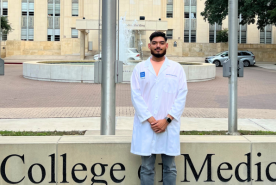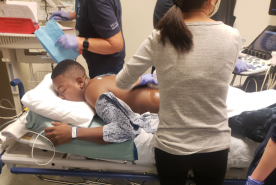Infections in the throat or on the skin can sometimes cause short term kidney disease in children. This happens when the immune system, which fights off infection, also attacks the kidneys during that fight. This can damage the kidneys and make them less able to filter blood until healing is complete.
Why common infections sometimes cause kidney problems in children

The kidneys have about one million tiny units that filter our blood and remove wastes from the body through the urine. Each of these units has a glomerulus (more than one of these structures are called glomeruli).
Sometimes the glomeruli become swollen or inflamed, causing glomerulonephritis (glow-mare-u-low-nef-ry-tis) soon after an infection. This is called post-infectious glomerulonephritis (PIGN). PIGN can be caused by different kinds of germs, including bacteria and viruses.
The most common type of PIGN is caused by a type of bacteria called streptococcus (strep). Post-streptococcal glomerulonephritis most often affects children 1-2 weeks after a streptococcal throat infection ("strep throat"). Less often, it can happen 3-6 weeks after a streptococcal skin infection. Children between 5-12 years old get it most often.
What are the common symptoms and lab results in a child with PIGN?
- Blood in the urine (hematuria) is the most common symptom of PIGN. Urine can look dark like the color of tea or cola. Sometimes you can't see the blood, but it can be found when the urine is tested in the lab or looked at with a microscope at the doctor's office. Hematuria happens when the glomeruli become damaged enough to leak blood into the urine.
- Body swelling (edema). This can start with swelling around the eyelids, especially when the child wakes up. In some children, you can also see swelling in other parts of the body like the ankles or the belly. This is caused by fluid building up in these areas. This swelling happens because the body is holding on to water and salt, and because the kidneys are making less urine. In severe cases, a child can have problems breathing because of fluid getting into the lungs.
- High blood pressure (hypertension). This is also caused by salt and water building up in the body and can be mild to severe. A very high blood pressure can cause problems in other organs, such as the brain or heart.
- Protein in the urine (proteinuria). A urine test may find that there is protein in the urine. While the urine protein level in PIGN is usually not high enough to cause a problem, in some cases it can become high enough to cause even more body swelling. This is because so much protein was lost in urine that there's not enough of it left in the body to do its usual job of keeping fluid in the right balance throughout the body. As a result, fluid leaks into wrong parts of the body and causes swelling.
- Decreased kidney function (acute kidney injury). Children with PIGN are often described as having acute kidney injury because the kidneys are less able to filter blood. "Acute" means that the kidney injury happens quickly and lasts for only a short time. Acute kidney injury is usually mild in PIGN but can be more severe.
How is PIGN diagnosed?
Your child's doctor will do a complete physical exam, which includes taking their blood pressure. Your child's urine and blood will also be tested.
The diagnosis is often easy to make based on the child's symptoms and results from blood and urine tests. Rarely, if symptoms get worse or the diagnosis is not certain, a kidney biopsy might be recommended.
What is the treatment for PIGN?
In very mild cases, no treatment is needed. Children are often asked to eat less salt until the PIGN gets better and the kidneys heal. Medicine may be needed to treat the symptoms (such as high blood pressure or swelling).
A child with very high blood pressure or severe swelling may need to go into the hospital for monitoring and to get medicine by mouth or through a needle in a vein (intravenous). Severe acute kidney injury is very rare in PIGN, but when it happens, short-term dialysis treatment may be needed.
How soon do children usually recover from PIGN?
Most symptoms of PIGN get better within 1-2 weeks, but small amounts of blood may still be found in the urine for many months. Your doctor may recommend a few follow-up visits. Repeat blood testing is usually needed at least once. Most children have a complete recovery of their kidney function.
Additional Information
Source
American Academy of Pediatrics, American Society of Pediatric Nephrology and the National Kidney Foundation Patient Education Collaborative (Copyright © 2020)
The information contained on this Web site should not be used as a substitute for the medical care and advice of your pediatrician. There may be variations in treatment that your pediatrician may recommend based on individual facts and circumstances.

















